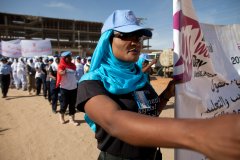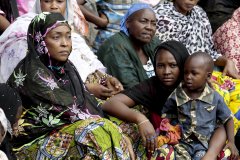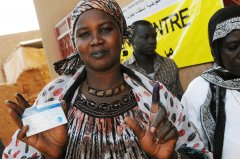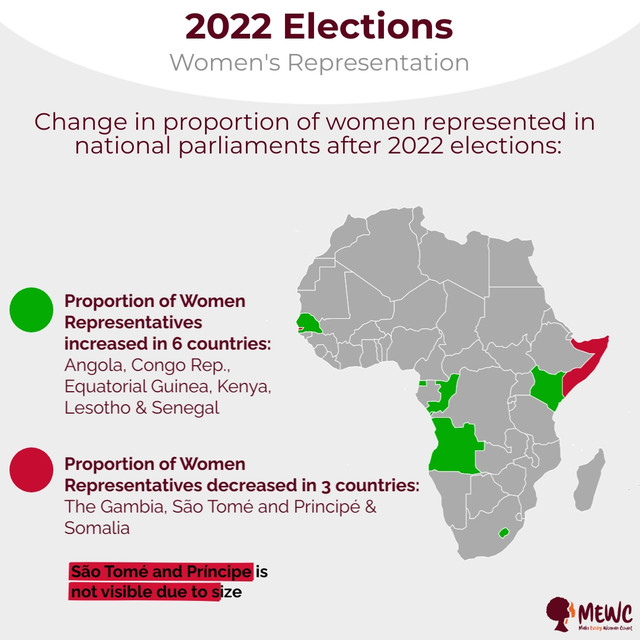Gender Issues Showlist
Women, Peace & Security
UNSCR 1325 calls on all parties to: protect and respect the rights of women and girls in conflict & post-conflict; increase women participation in all conflict resolution, peacekeeping and peace-building & to end impunity by prosecuting perpetrators of sexual and other violence on women and girls
index.php?option=com_content&view=category&id=56&Itemid=1913
Human Rights of Women
Thirty six years after the adoption of CEDAW, many women and girls still do not have equal opportunities to realize rights recognized by law. Women are denied the right to own property or inherit land. They face social exclusion, “honor killings”, FGM, trafficking, restricted mobility, early marriage,...
index.php?option=com_content&view=category&id=44&Itemid=1908
Violence Against Women
Violence against women is the most shameful human rights violation. Gender based violence not only violates human rights, but also hampers productivity, reduces human capital and undermines economic growth. It is estimated that up to 70 per cent of women experience violence in their lifetime
index.php?option=com_content&view=category&id=69&Itemid=1912
Political Participation & Leadership
Where women are fully represented, societies are more peaceful and stable. Women political participation is fundamental for gender equality and their representation in positions of leadership must be a priority for all Africans governments.
index.php?option=com_content&view=category&id=65&Itemid=1911
Latest News
- DJIBOUTI: Women Leaders in Djibouti Speak Out Against Gender-Based Violence and Harmful Practices
- GHANA: Margaret Busby - How a Pioneering Ghanaian Publisher Put African Women's Writing On the Map
- WE'RE RECRUITING RESEARCH FELLOWS! Apply before 15 May 2024
- CONGO- KINSHASA: Congolese Woman Excels in Beekeeping
- SUDAN: Scourge of Sexual Violence Amid Ongoing Conflict Demands Urgent Response
- MALAWI: Malawi Takes Steps to End Poverty Among Women and Girls
- NIGERIA: Period Poverty: Millions Bleed in Silence as Prices of Sanitary Hit the Roof
- COMOROS: Presidential election 2024
- SOUTH AFRICA: Climate Change Makes Life Harder - in South Africa It's Likely to Bring Heatwaves, Water Stress and Gender-Based Violence
- LIBERIA: Liberians Call for Greater Government Efforts to Promote Gender Equality
Women, Peace and Security: from Resolution to Action - Ten Years of Security Council Resolution 1325
Source: ReliefWeb
This publication summarizes the proceedings of the seminar entitled “Women, Peace, and Security:
From Resolution to Action.
Ten years of Security Council Resolution 1325”, held in Geneva on 15 September 2010. Convened jointly by the United Nations Office at Geneva (UNOG), the Belgian Presidency of the Council of the European Union and the Geneva Centre for the Democratic Control of Armed Forces (DCAF), the seminar is part of an ongoing series of joint events hosted by DCAF and UNOG since 2003, addressing various aspects of security governance.
October 2010 marked ten years since the adoption of United Nations Security Council Resolution 1325, whereby the international community acknowledged – for the first time – the critical role of women in global peace and security. Resolution 1325 called on the international community to address the various impacts of conflict on women and to engage them fully in conflict resolution, peacekeeping and peacebuilding. The foundation was further broadened through Resolutions 1820, 1888 and 1889, which linked the prevention of sexual violence, peacemaking and mediation.
Together, these Resolutions now offer a powerful framework and mandate for implementing and measuring change in the lives of women in conflict‐affected countries.
Yet, in practice, only limited and sporadic progress has been achieved. While women remain a minority of combatants and perpetrators of war, they continue to suffer the greatest harm. Women are still poorly represented in formal peace processes, although they contribute in many informal ways to conflict resolution. In fact, in recent peace negotiations, women have represented fewer than 8 percent of participants and less than 3 percent of signatories. Women in war‐torn societies continue to face devastating forms of sexual violence, while ineffectively designed transitional justice mechanisms discourage them from testifying about these crimes.
To read the full report, please click here





